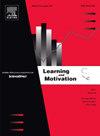人工智能驱动的个性化学习:通过期望值理论提高成人教育中的自我效能感、动机和数字素养
IF 1.7
4区 心理学
Q3 PSYCHOLOGY, BIOLOGICAL
引用次数: 0
摘要
尽管人工智能(AI)在教育环境中的应用越来越突出,但专门研究其对中国成年男性英语作为外语(EFL)学习者的关键学习者相关变量(如自我效能感、动机和数字素养)影响的实证研究仍然有限。本研究通过调查人工智能驱动的个性化学习干预对这些关键结构的影响来解决这一差距。183名中级水平的中国男性英语学习者被随机分为实验组(EG)和对照组(CG),实验组接受人工智能个性化教学,对照组采用传统教学方法。通过干预前和干预后调查收集数据,并使用独立t检验进行分析。结果表明,与CG组的参与者相比,EG组的学习者在自我效能感、动机和数字素养方面表现出统计学上显著的改善。这些发现提供了强有力的经验证据,支持人工智能个性化教学策略在提高中国成年男性英语学习者基本属性方面的有效性。因此,该研究提倡人工智能个性化学习的战略整合,强调其在成人英语教育中优化语言学习成果的巨大潜力。本文章由计算机程序翻译,如有差异,请以英文原文为准。
AI-powered personalized learning: Enhancing self-efficacy, motivation, and digital literacy in adult education through expectancy-value theory
Although the implementation of artificial intelligence (AI) in educational contexts has gained increasing prominence, empirical research specifically examining its influence on crucial learner-related variables (e.g., self-efficacy, motivation, and digital literacy) among adult male learners of English as a Foreign Language (EFL) in China remains limited. The present study addresses this gap by investigating the effects of AI-powered personalized learning interventions on these key constructs. A total of 183 intermediate-level Chinese male EFL learners were randomly assigned either to an experimental group (EG), which received AI-personalized instruction, or to a control group (CG), which engaged in traditional instruction methods. Data were gathered through pre- and post-intervention surveys and analyzed using independent t-tests. Results indicated that compared to participants in the CG, learners in the EG exhibited statistically significant improvements in self-efficacy, motivation, and digital literacy. These findings offer robust empirical evidence supporting the effectiveness of AI-personalized instructional strategies in enhancing essential learner attributes within the adult male EFL context in China. Thus, the study advocates for the strategic integration of AI-powered personalized learning, highlighting its considerable potential to optimize language learning outcomes within adult EFL education.
求助全文
通过发布文献求助,成功后即可免费获取论文全文。
去求助
来源期刊

Learning and Motivation
Multiple-
CiteScore
2.90
自引率
0.00%
发文量
53
期刊介绍:
Learning and Motivation features original experimental research devoted to the analysis of basic phenomena and mechanisms of learning, memory, and motivation. These studies, involving either animal or human subjects, examine behavioral, biological, and evolutionary influences on the learning and motivation processes, and often report on an integrated series of experiments that advance knowledge in this field. Theoretical papers and shorter reports are also considered.
 求助内容:
求助内容: 应助结果提醒方式:
应助结果提醒方式:


